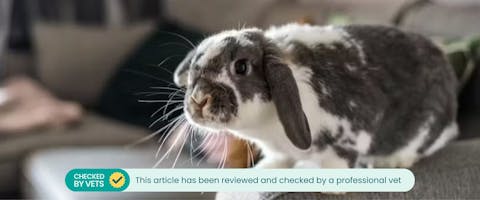Updated 11/12/2023
Did you know your rabbit’s teeth are open-rooted and grow continuously throughout their life? Around 2-3mm every week, in fact!
To make sure we’re clued up on the ins-and-outs of rabbit dental health and how to care for a rabbit, we spoke to the experts at The Vet Connection, who were more than happy to share their expertise.
So, if you’re wondering how to check your rabbit's teeth or want to know how to spot the warning signs of a potential problem, then get ready. It’s time to hop into the answers below...
--
Checking your rabbit’s teeth
Rabbits have four large white incisor teeth at the front, and you should check these at least once a week if you have a pet rabbit. They should be white and have a neat chisel-shaped bite edge — this sharp biting edge is used to cut the grass and vegetation when eating, and so the alignment of these front teeth is very important to ensure they are worn down correctly.
Behind the incisors at the front, are peg teeth and molars. The molars are the teeth that chew and grind the vegetation. Rabbits are almost constant chewers, and they chew in a circular motion to grind up the vegetation for digestion. It's the grinding and chewing that keep their constantly growing teeth in good shape. As these molars are situated in the back of a rabbit’s mouth, you won’t be able to check these at home. They need to be checked by a vet, usually using special instruments.
Dental problems – how to spot the warning signs
Rabbit's teeth are designed to be constantly worn down by chewing and are then replaced by growth from the tooth root. Keeping the growth and the wear in balance is the key to healthy teeth in your rabbit.
Dental problems mainly tend to occur when your rabbit’s teeth are not worn down at the correct rate. This can be due to their diet not having enough roughage to encourage lots of chewing, or that their teeth are out of alignment due to genetics or trauma (this is called malocclusion). Having a diet low in roughage but high in pellets or dry food (which do not wear down the teeth) is the commonest cause of dental problems in pet rabbits.
Trending posts
Purr-use some of the top blogs our members have been loving this month- Top male dog names for your new furry friendGot a new furry family member in your pack? Check…

- Top female dog names for your new fluffy palWelcoming a new pooch into your family? Explore…

- 250+ gray cat names your silver feline will loveRecently welcomed a fluffy gray bundle of joy into…

- What are normal pet sitting rates?Discover the average pet sitting rates for animals…

- Unique dog names to stand out from the packDare to be different with our list of the best…

Keeping the growth and the wear in balance is the key to healthy teeth in your rabbit
Since we can only see the front four incisors, spotting dental disease in your rabbit can sometimes be quite difficult. There are, however, some outward signs that we can look for:
- Weight loss, as it is difficult for your rabbit to eat
- Reduced grooming and sometimes matting of faecal material around your rabbit’s bum
- Drooling and wetness on the front paws and neck
- Going off hay and grass because it is too painful to chew
If you notice any of these signs or are worried for any reason, then it is best to take your rabbit to the vet for a check over. If your rabbit stops eating and pooping, contact your emergency vet straight away. Rabbits can get gut stasis (when their intestines stop moving) secondary to dental issues and pain.
Treating overgrown teeth
As with most conditions, prevention is better than cure. However, if your rabbit’s teeth are overgrown it might be necessary for your vet to trim them. This is generally a straightforward procedure, but it is likely to require a short general anaesthetic.
Remember, it is always a good idea to have your rabbit’s teeth checked thoroughly by the veterinary team as part of their general or vaccine health check.
Meet our veterinary expert, Aisling
This article has been checked by veterinarian Aisling O’Keeffe MVB CertSAM ISFMCertAdvFB. Aisling qualified as a vet 7 years ago from University College Dublin. She has worked in a mixture of UK small animal hospitals along with Irish practices. She worked for 3 years in a feline-only hospital where she further developed her feline medicine and surgery skills. She currently lives and works in a small animal hospital in Cork, Ireland.
Don't forget, during all sits TrustedHousesitters members have unlimited access to a free 24/7 Vet Advice Line. So, for general worries to expert help and advice while on a sit, simply head to your member dashboard to contact your free Vet Advice Line.
Vacation pet sitting, with love
Here for all pets, TrustedHousesitters members care for rabbits, cats, dogs, llamas — you name it — for free. That's because we're a community of genuine pet lovers, who simply love spending time with pets. So, if you're a pet owner, you can be sure your furry, feathered or finned friends are in safe, loving hands. Want to find out more? Check out how it works, visit our friendly Community Forum or become a member of our pet-loving community today.

